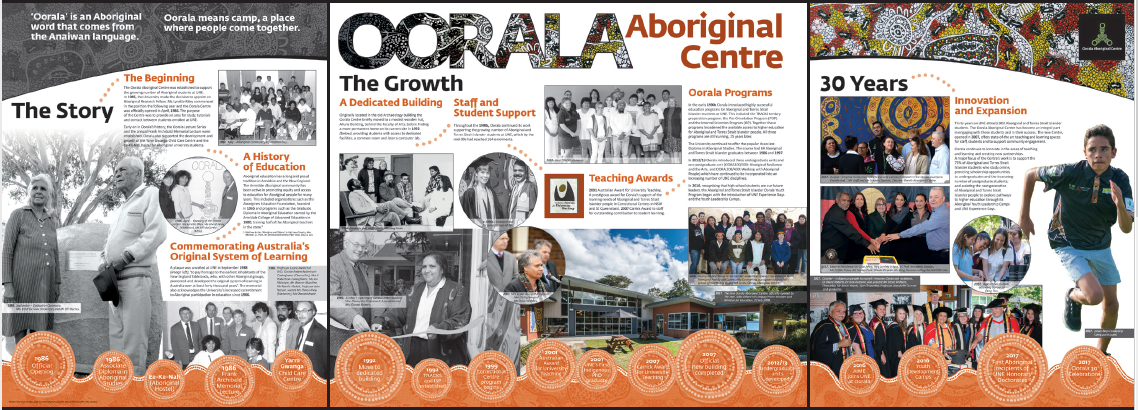The Story of Oorala Aboriginal Centre
'Oorala' is an Aboriginal word that comes from the Anaiwan language. Oorala means camp, a place where people come together.
This storyboard installation depicting Oorala's milestones is found in the Oorala entrance way.
The Beginning of the Oorala Centre
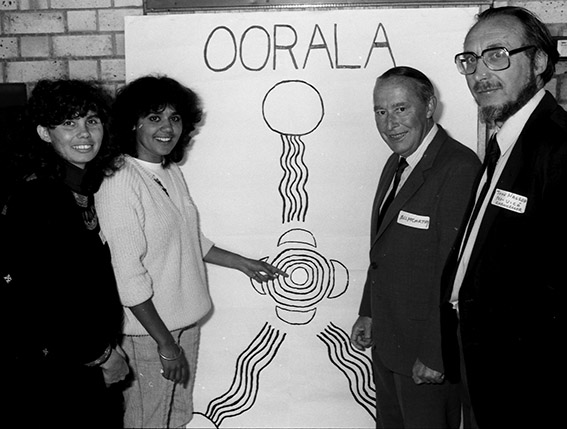 The Oorala Aboriginal Centre (originally known as the Aboriginal Resource Unit) was established to support the growing number of Aboriginal students at UNE. In 1985, the University made the decision to appoint an Aboriginal Research Fellow. Ms Lynette Riley commenced in the position the following year and the Centre officially opened in April, 1986. The purpose of the Centre was to provide an area for study, tutorials and contact between students enrolled at UNE.
The Oorala Aboriginal Centre (originally known as the Aboriginal Resource Unit) was established to support the growing number of Aboriginal students at UNE. In 1985, the University made the decision to appoint an Aboriginal Research Fellow. Ms Lynette Riley commenced in the position the following year and the Centre officially opened in April, 1986. The purpose of the Centre was to provide an area for study, tutorials and contact between students enrolled at UNE.
Early on in Oorala’s history the Oorala Lecture Series and the annual Frank Archibald Memorial Lecture were established. Oorala also 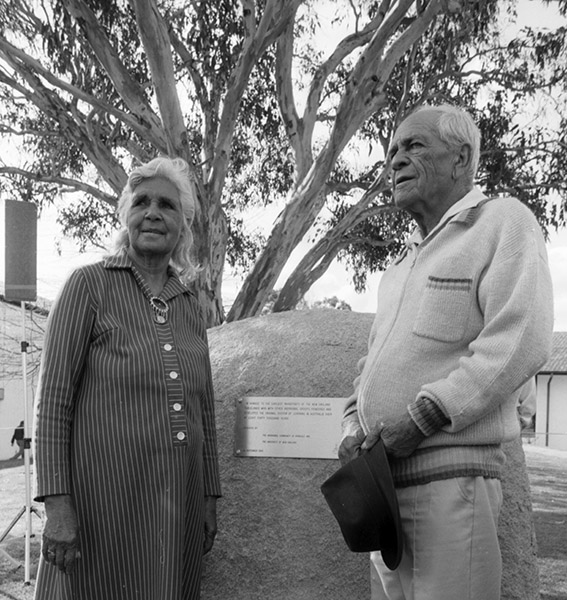 supported the development and growth of the Yarm Gwanga Child Care Centre and the Ee-Ke-Nah hostel for Aboriginal university students.
supported the development and growth of the Yarm Gwanga Child Care Centre and the Ee-Ke-Nah hostel for Aboriginal university students.
A History of Education
Aboriginal education has a long and proud tradition in Armidale and the New England. The Armidale Aboriginal community has been active in promoting equity and access to education for Aboriginal people for many years. This included organisations such as the Aborigines Education Foundation, founded in 1965 and programs such as the Graduate Diploma in Aboriginal Education started by the Armidale College of Advanced Education in 1980, which trained half of the Aboriginal teachers in NSW.
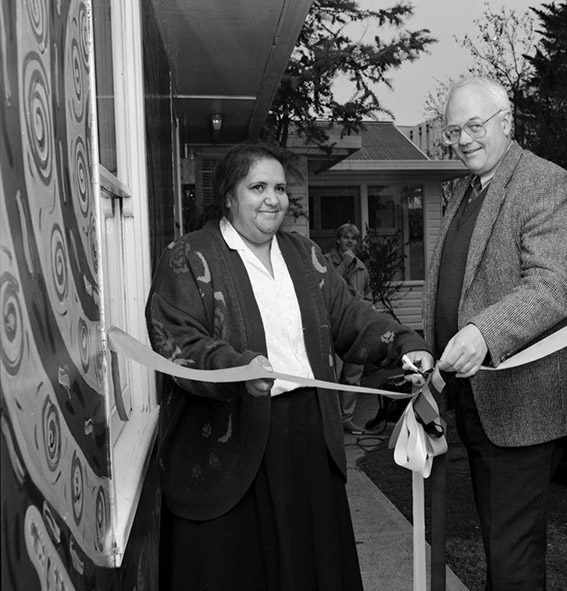
Commemorating Australia’s Original System of Learning
A plaque was unveiled at UNE in September 1988, to ‘pay homage to the earliest inhabitants of the New England Tablelands, who, with other Aboriginal groups, pioneered and developed the original system of learning Australia over at least forty thousand years’. The memorial also acknowledges the university’s increased commitment to Aboriginal participation in education since 1986.
A Period of Growth
A dedicated building
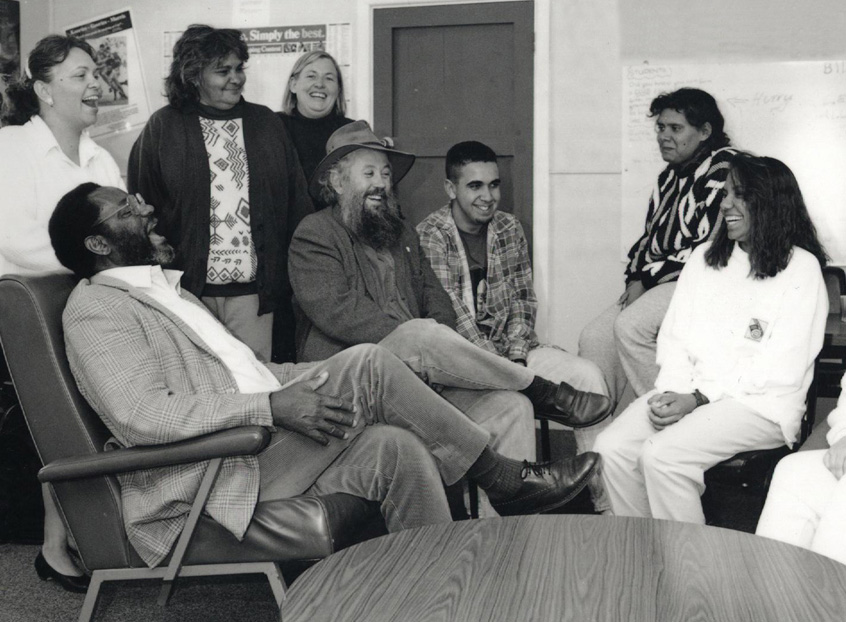 Originally located in the old Archaeology building the Oorala Aboriginal Centre briefly moved to a modest wooden hut, the Alluna Building, behind the Faculty of Arts, before finding a more permanent home on its current site in 1992, providing students with access to dedicated facilities, a common room and later a computer lab. In 1993 the Aboriginal Resource Unit was renamed and became the ‘Oorala Aboriginal Centre’.
Originally located in the old Archaeology building the Oorala Aboriginal Centre briefly moved to a modest wooden hut, the Alluna Building, behind the Faculty of Arts, before finding a more permanent home on its current site in 1992, providing students with access to dedicated facilities, a common room and later a computer lab. In 1993 the Aboriginal Resource Unit was renamed and became the ‘Oorala Aboriginal Centre’.
Staff and student support
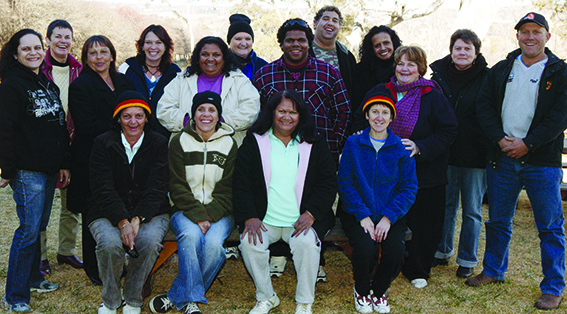 Throughout the 1990s, Oorala continued its work supporting the growing number of Aboriginal and Torres Strait Islander students at UNE, which by the mid 1990s had reached 164 enrolments.
Throughout the 1990s, Oorala continued its work supporting the growing number of Aboriginal and Torres Strait Islander students at UNE, which by the mid 1990s had reached 164 enrolments.
Oorala programs
In the early 1990s Oorala introduced highly successful education programs for Aboriginal and Torres Strait Islander students at UNE. This
included the TRACKS tertiary preparation program, the Pre-Orientation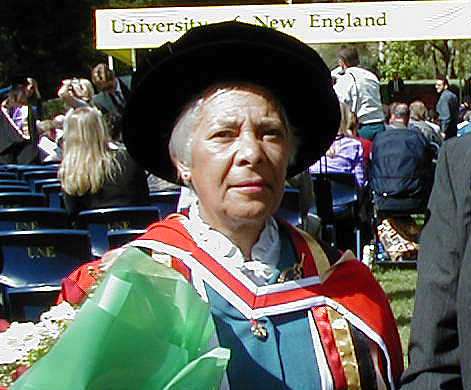
Program (POP) and the Internal Selection Program (ISP). Together these programs broadened the available access to higher education for Aboriginal and Torres Strait Islander people. All three programs are still running, 25 years later.
The University continued to offer the popular Associate Diploma in Aboriginal Studies. The course had 69 Aboriginal and Torres Strait Islander graduates between 1986 and 1997.
In 2001 UNE's first Indigenous PhD graduate, Margaret Weir, gained her Doctorate of Philosophy.
Teaching Awards
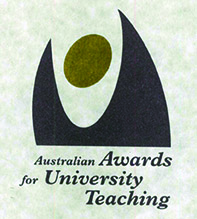 2001 Australian Award for University Teaching. A prestigious award for Oorala's support of the learning needs of Aboriginal and Torres Strait Islander people in Correctional Centres in NSW and South-East Queensland 2007 Carrick Award to staff for outstanding contribution to student learning.
2001 Australian Award for University Teaching. A prestigious award for Oorala's support of the learning needs of Aboriginal and Torres Strait Islander people in Correctional Centres in NSW and South-East Queensland 2007 Carrick Award to staff for outstanding contribution to student learning.
A new building
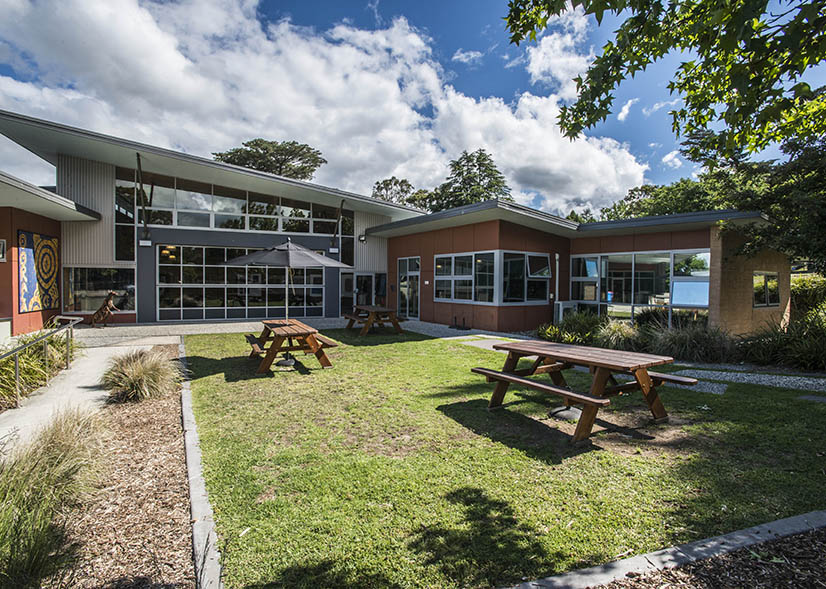 In 2002 UNE was awarded a Commonwealth grant through the Department of Education, Science and Training, for design and construction of a new building for Oorala. The existing Oorala building was demolished and by early 2007 Oorala was located in its new Centre with state-of-the art teaching and learning spaces for staff, students and to support community engagement.
In 2002 UNE was awarded a Commonwealth grant through the Department of Education, Science and Training, for design and construction of a new building for Oorala. The existing Oorala building was demolished and by early 2007 Oorala was located in its new Centre with state-of-the art teaching and learning spaces for staff, students and to support community engagement.
The new Oorala Aboriginal Centre was officially opened on 22 July 2008 by The Hon. Julia Gillard, MP, former Deputy Prime Minister and Minister for Education.
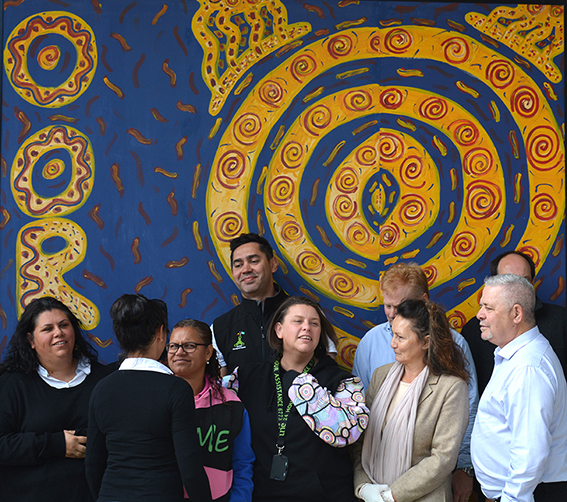 UNE Oorala units introduced
UNE Oorala units introduced
In 2012/13 Oorala introduced three undergraduate units and one post-graduate unit (OORA 100/300: Aboriginal Resilience and the Arts, and OORA 200/400: Working with Aboriginal People) which have continued to be incorporated into an increasing number of UNE disciplines.
In 2016, recognising that high school students are our future leaders, the Aboriginal and Torres Strait Islander Oorala Youth Program began with the introduction of UNE Experience Days and the Youth Leadership Camps.
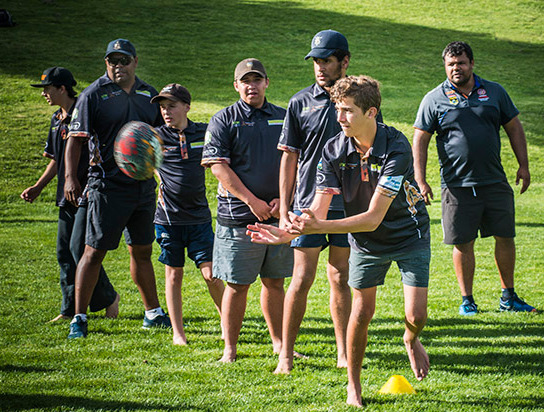 Innovation and expansion
Innovation and expansion
The Oorala Aboriginal Centre, (UNE) funded Aboriginal and Torres Strait Islander students, staff and other researchers to attend World Indigenous Peoples Conference on Education (WIPCE) in Hawaii (2014) and Toronto, Canada (2017).
The Oorala Aboriginal Centre has become an integral part in the engagement of UNE’s nearly 900 Aboriginal and Torres Strait Islander students and thirty years after its founding the Centre successfully celebrated its 30th anniversary in 2017.
 A major focus of the Centre’s work is to support the 80% of Aboriginal and Torres Strait Islander students who study online; providing scholarship opportunities to undergraduate and the increasing number of post-graduate students; and assisting the next generation of Aboriginal and Torres Strait Islander people to explore pathways to higher education through its Youth Leadership Camps and UNE Experience Days.
A major focus of the Centre’s work is to support the 80% of Aboriginal and Torres Strait Islander students who study online; providing scholarship opportunities to undergraduate and the increasing number of post-graduate students; and assisting the next generation of Aboriginal and Torres Strait Islander people to explore pathways to higher education through its Youth Leadership Camps and UNE Experience Days.
Honorary Doctorates
2017 saw Prof Jack Beetson and Mrs Dianne Roberts awarded 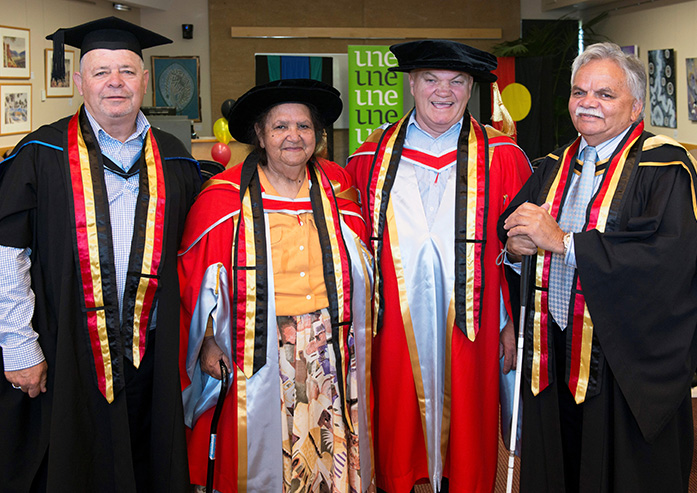 Honorary Doctor of Letters honoris causa (HonDLitt), the first Aboriginal recipients of UNE Honorary Doctorates. Professor Beetson is honoured for his outstanding and ongoing contribution to adult education in Indigenous communities both in Australia and overseas. Mrs Roberts was nominated for her distinguished service to the Aboriginal community within the broader New England region as well as her continuing service to the Oorala Aboriginal Centre at UNE and Aboriginal education, generally.
Honorary Doctor of Letters honoris causa (HonDLitt), the first Aboriginal recipients of UNE Honorary Doctorates. Professor Beetson is honoured for his outstanding and ongoing contribution to adult education in Indigenous communities both in Australia and overseas. Mrs Roberts was nominated for her distinguished service to the Aboriginal community within the broader New England region as well as her continuing service to the Oorala Aboriginal Centre at UNE and Aboriginal education, generally.
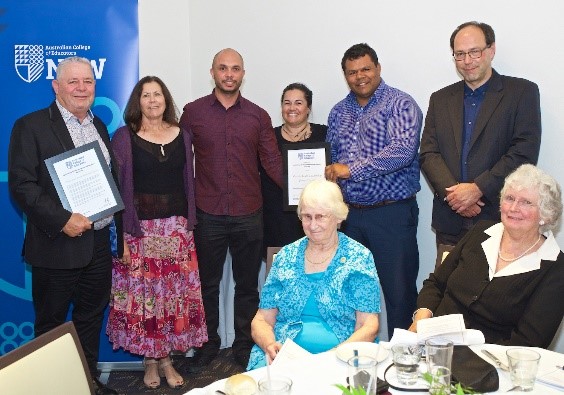 The inspiring Oorala Youth Leadership Camps won the Cynthia Briggs Empowerment through Education Award in 2018 for educational collaboration. The camps program was also shortlisted for an Australian Financial Review Higher Education Award for Community Engagement in 2019.
The inspiring Oorala Youth Leadership Camps won the Cynthia Briggs Empowerment through Education Award in 2018 for educational collaboration. The camps program was also shortlisted for an Australian Financial Review Higher Education Award for Community Engagement in 2019.
Indigenous Scholars / TRACKS Peer Support Program was developed in 2019 linking students commencing their tertiary study journey in the TRACKS tertiary preparation program with successful Indigenous Scholars, who act as informal mentors. Oorala was a
stakeholder in the development of the UNE 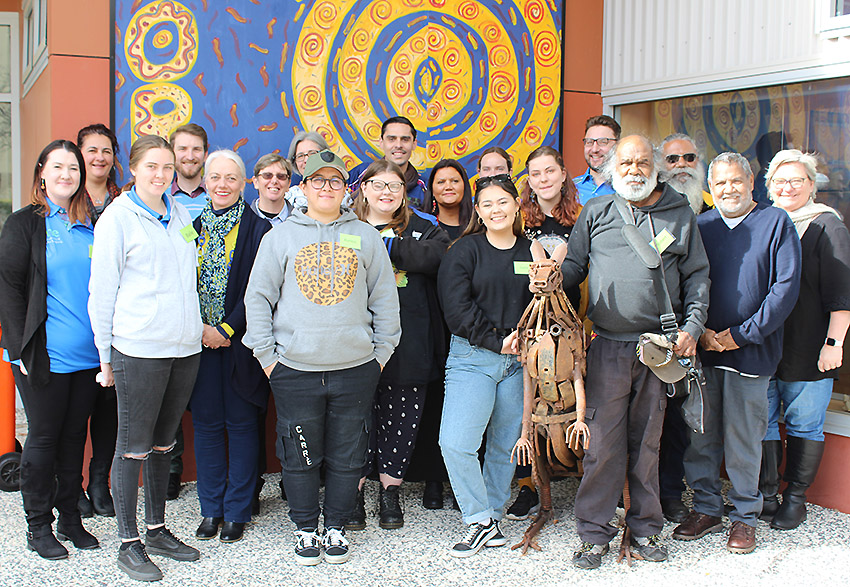 Indigenous Workforce Strategy which was launched in 2019.
Indigenous Workforce Strategy which was launched in 2019.
The University of New England’s inaugural Reconciliation Action Plan (RAP) with endorsement by Reconciliation Australia was launched in 2020
Professor Joe Fraser, UNE’s inaugural Pro Vice-Chancellor Indigenous, joined UNE in 2021 with a strong focus on Indigenous student success at senior level which encompasses more than just the 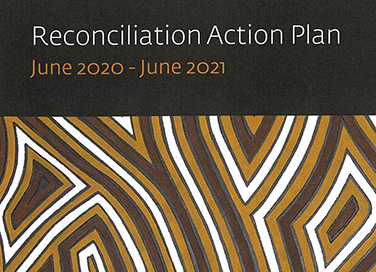 numbers. Prof. Fraser was keen to promote discussion on how to build inclusivity, encourage participation, advice and consultation across different groups of people.
numbers. Prof. Fraser was keen to promote discussion on how to build inclusivity, encourage participation, advice and consultation across different groups of people.
Uncle Colin Ahoy was awarded an Honorary Doctor of Letters Honoris Causa (HonDLitt) at the University of New England’s Autumn Graduation 2022 for his longstanding commitment to Aboriginal education as well as his extensive and diverse community involvement. He became one of the first Anaiwan people to be so
honoured by the University.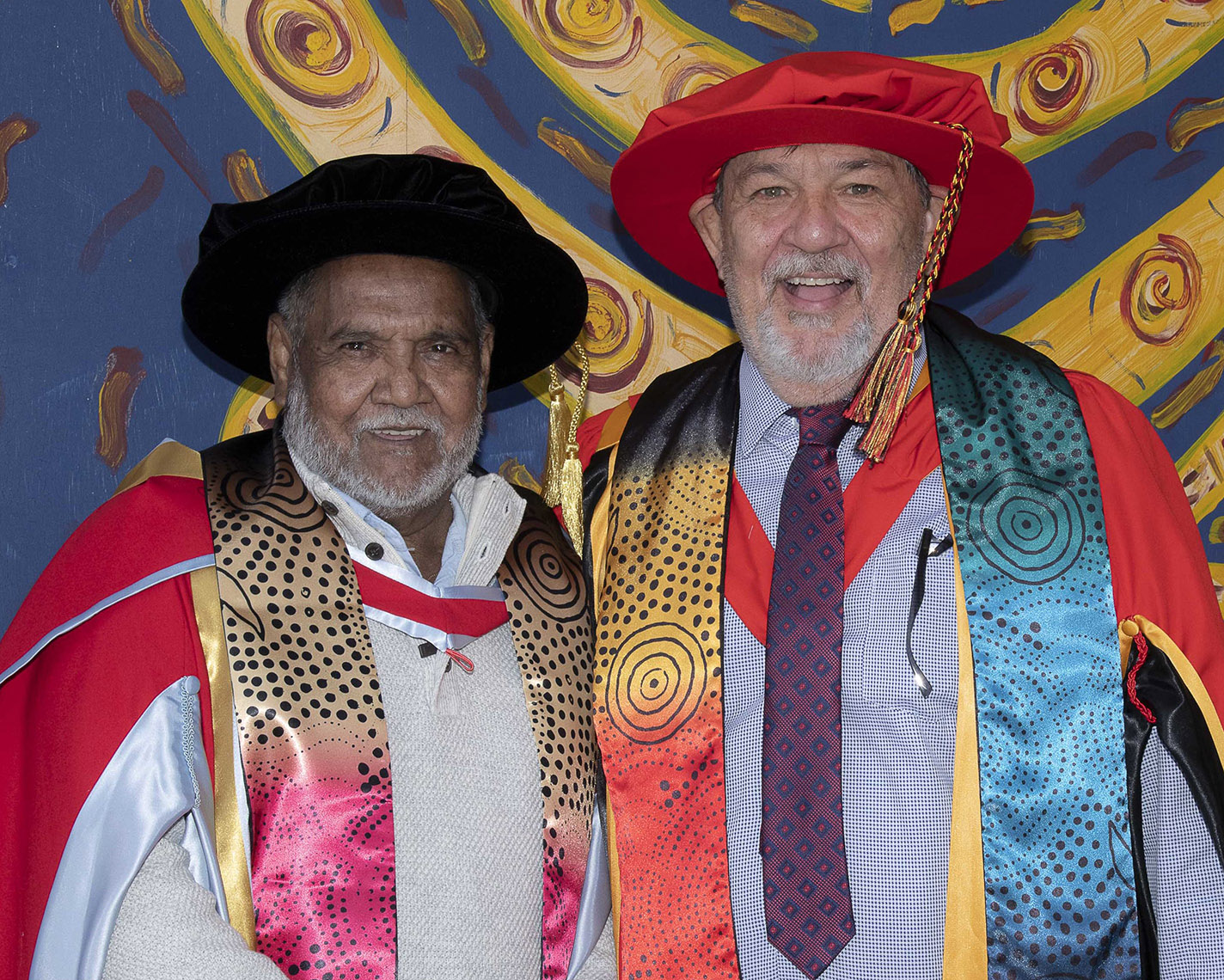
Today, UNE has approximately 1,000 Aboriginal and Torres Strait Islander students who are following over 1,300 graduates. Oorala has more than 20 staff working at the Centre and continues to innovate in
the areas of teaching and learning and creating new partnerships. A major focus of the Centre’s work is to support the 75% of students who study online; providing scholarship opportunities to undergraduate and the increasing number of post-graduate students; and assisting the next generation of Aboriginal and Torres Strait Islander people to explore pathways to higher education through its Oorala Experience Days Program

